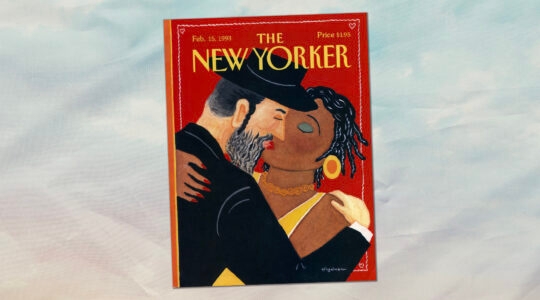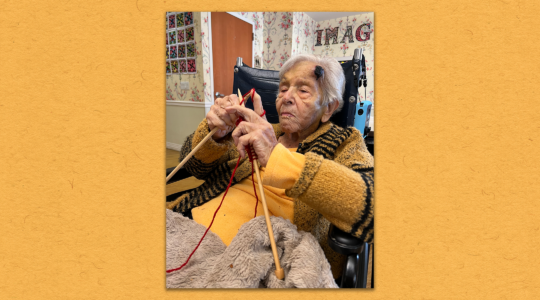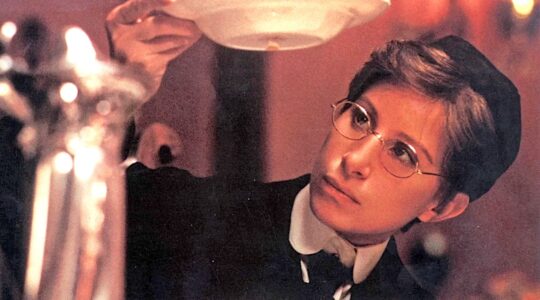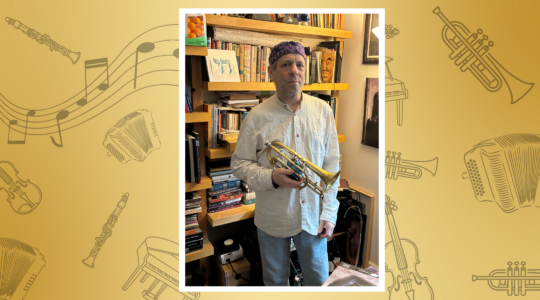A telling and dramatic moment at the national conference of JOFA (the Jewish Orthodox Feminist Alliance) at Columbia University on Sunday came when a plenary speaker, noting the group’s progress in seeking roles for women in the clergy, asked how many women in the room had semicha (rabbinic ordination) or were studying for the rabbinate.
More than 20 women stood up, as the audience burst into applause.
Lila Kagedan, who last year became the first female clergy member to preside in an Orthodox synagogue while using the title “rabbi,” marveled at how many Orthodox young women today consider “becoming a rabbi just another option available to them. The shift since I was in high school and college is so significant, it can be hard to believe.”
But she warned, “we can’t take this progress for granted.”
No doubt she and many in the crowd of 1,200 — believed to be an attendance record for the conference, held every three years — were aware that the Orthodox Union (OU), the influential national body that serves hundreds of synagogues around the country, is expected to soon issue a statement on the role of women in Jewish life. Some fear it could ban women from the clergy, but others note that JOFA and its members may be beyond worrying about the implications.
One JOFA leader noted that board members “used to be so nervous” about offending rabbinic authority, but no longer. As Bat Sheva Marcus, the president of the group told The Jewish Week, “we exist — we don’t have to prove our existence.”
With the large crowd and dozens of sessions, there was an air of confidence and celebration at the gathering, a stark contrast to the national political climate in which many fear women’s rights — including reproductive choice and equal pay for equal work — are imperiled. Sessions were packed, with participants frequently sitting on the floor to make it into crowded seminars. And it appeared that this year’s crowd was younger, about half male, and increasingly diverse.
Avigayil Halpern, a 20-year-old college sophomore at Yale University and a panelist at the conference, said that though her roots are in Orthodox feminism, she now identifies as “halachic egalitarian.” Halpern attended Orthodox day schools through high school and discovered a “passion for Talmud” in an all-girls Talmud class during her freshman year. Today, the Judaic studies major and West Hartford, Conn., native puts on tefillin, the ritual prayer boxes traditionally worn by Orthodox men, and wears tzitzit, the ritual traditionally-male worn garment.
Perhaps that’s not the vision Orthodox feminists like founder Blu Greenberg had two decades ago when the group began, but it’s clear JOFA’s role has expanded beyond feminist ritual.
“We are becoming the change agent in the Orthodox community,” Marcus asserted, noting the variety of sessions, like those on sexual orientation, destigmatizing mental illness, single motherhood by choice and blurred boundaries.
“This is a moment for JOFA,” said executive director Sharon Weiss-Greenberg, who noted that more 60 high school students and nearly 100 college students were in attendance. “Our message is resonating with a younger crowd,” she said. “There is an air of taking ownership of the future. Young women see that change really is possible.”
At a crowded session entitled “First Comes Semicha, then comes…?” Rabba Sara Hurwitz, the first woman to receive Orthodox ordination, and Rabbi Shlomo Riskin, chief rabbi of Efrat and an advocate for female clergy, praised recent progress despite criticism from more traditional circles.
“Women must become dayanot (religious court judges),” said Rabbi Riskin, to thunderous applause from the crowd. (Currently, the position is held only by Orthodox men.) While pulpits used to represent the “highest and hardest glass ceiling,” that is no longer the case, said Rabba Hurwitz.
The significant internal pushback female clergy received in the past few years — the largest Orthodox rabbinical association, the Rabbinical Council of America, affirmed a resolution in 2015 barring women’s ordination — served only to “create a groundswell of support and expand our base,” Rabba Hurwitz said.
Despite the conference’s ebullient tone, several participants from the Baby Boomer generation said they preferred past conferences that focused on specific issues like freeing agunot [women trapped in failed marriages] or women’s tefillah groups.
“The big question for me is what is the focus moving forward?” said Lisa Steinmetz, a mother of four who attended the previous JOFA conference. She felt this one lacked direction. The breadth of issues undertaken did a disservice to the organization’s central mission, she said.
Tova Weiss, 54, a Connecticut resident and mother of four, also noted a “lack of focus.” She felt the conference had “lost touch with its base and the women JOFA was created to serve.” Some of the sessions — including one that focused on the overlap between homosexuality and feminism — left her feeling out of the conversation.
While the conference’s “intersectional” focus — a buzzword on college campuses today used to describe the interconnected nature of race, class and gender — left some participants at a loss, it seemed to energize the younger crowd of feminists, indicating a generational divide. Sessions dealing with sexuality were standing-room only.
Shoshi Singer, a 22-year-old junior at Brandeis who describes herself as an Orthodox feminist, was “very impressed with the frankness and honesty of the conversation,” especially regarding sexuality.
“The fact that we can have this conversation in an open and honest way shows the progress Orthodox feminism has made,” she said.
A Saturday night women-only reading of Monologues From The Makom, based on the Vagina Monologues, was described as a moving experience for many who attended.
Mira Goldstein, 22, a student at York University in Toronto, was also impressed with the “bold and diverse” session offerings. She attended a session about women disappearing from public view in ads and newspaper editorial content. “We’ve made a lot of gains, but we clearly have a long way to go,” she said. Though she couldn’t relate to a “life of invisibility,” it was a sad revelation for her that images of women were still being suppressed in some Orthodox circles.
Halpern, the Yale sophomore, embraced the conference’s intersectional focus, but wondered what’s next for Orthodox feminism as “fewer and fewer things are cutting-edge.” Though a handful of Orthodox female rabbis are gaining acceptance, most Orthodox congregations still wouldn’t consider hiring a female clergy member. Halpern decided to leave Orthodoxy when she “kept hitting walls” while seeking “true egalitarian practice.”
Still, Marcus left the conference feeling “more confident than ever” about the movement’s future.
“Look around,” she said, gesturing at the packed entrance hall where women from all walks of life milled about, talking, laughing and catching up during a late afternoon lunch. The conference numbers, and the increasingly young age of participants, left her proud and astounded. JOFA’s “expanding agenda” is responding to a growing communal need, she said. “Feminism, and particularly Orthodox feminism, is being used as a lens to view everything,” she said. “Parenting, authority, politics — you can’t address any of these issues without addressing gender. Whoever said feminism is dead?”
The New York Jewish Week brings you the stories behind the headlines, keeping you connected to Jewish life in New York. Help sustain the reporting you trust by donating today.




